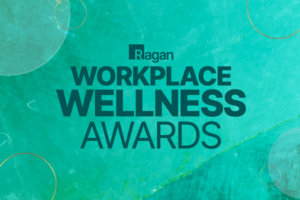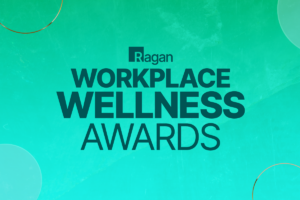How wellness and upskilling intersect
Comms can serve as a connector to help employees improve their mental health and job aptitude.

A happy employee is often a better worker, and an organization full of happy employees is more likely to be a strong one. A 2023 study in Management Science found that happiness increases productivity, too, with each one-unit increase in happiness (on a scale of 0-10) leading to a 12% increase in productivity.
So how can employees upskilling employees feed that happiness and contribute to a culture of wellness at work that helps them become more competent in their roles? With the proper strategy, quite a bit.
Professional development with a wellness focus
The wellness and professional development connection is easy to visualize as a cycle. If an employee has access to the latest tools, technologies, and upskilling opportunities, they’re going to be a better asset to the organization. Additionally, employees who upskill are more likely to be productive and innovative. It’s a win-win for both sides.
Calendar co-founder John Hall outlined the steps that orgs can take and that comms pros can promote for optimal professional development. They included:
- Continuing education: More learning makes an employee more engaged, and more knowledgeable. Perhaps the company can cover credits related to one’s specific job function or pay for an employee to earn a certification. These offerings show the company cares about an employee’s understanding and on-the-job learning.
- The 70/20/10 rule: States that an employee’s experiences should be based on 70% challenging assignments and experiences, 20% developmental relationships, and 10% coursework and training. With the knowledge that relationships are the foundation of good learning environments, organizations should seek to structure time for coworkers to connect and learn from one another.
- Connections to performance: Employee certifications can add to confidence in their skills and role. Additionally, those who are certified can share their journey and experiences with their coworkers, creating a cycle of inspiration and knowledge sharing.
Professional development and upskilling don’t always have to mean improving acuity in things that are directly related to your role — soft skills matter too. Organizations should strive to offer professional development in the softer workplace skills. These can include relationship building on a team, stress management, and improving interpersonal connections — all of which can contribute to an increased sense of wellness. In many ways, the session on stress management and relaxation is just as important as the webinar on how to become a better marketer.
This soft skill development should come from a manager or mentor who best exemplifies the behavior the employee is trying to excel in. Accountability should also be a big part of any soft skill development plan. This is achieved by managers including these soft skills as part of an overall professional development roadmap.
By showing employees how their professional development and their sense of wellness at work are inextricably linked, you can get the message out that not only is upskilling in both hard and soft skills important for job acumen, but mental health and wellness as well.
Launching properly and impacts outside the office
Upskilling programs are undoubtedly an asset for any organization and an increasingly necessary one for organizations to stay competitive in today’s marketplace. A lot of making professional development and wellness effectively intersectional relies on how the organization structures these efforts.
In 2022, Ragan’s Isis Simpson-Mersha interviewed Danny Kim, Ph.D., then of Raindrop. Kim described how Raindrop’s wellness committee embedded itself in the organization’s overall structure, including a wellness channel for employees to share their experiences. He emphasized that wellness shouldn’t be a mandate, but instead a collaborative process.
The same is true when comms works to intersect wellness and professional development. Give people the opportunities but don’t make them seem forced. While it doesn’t need to be a top-down process, earning the support of leadership will go a long way towards legitimizing the efforts of any professional development or wellness push, or ideally, one that combines both.
Similarly, upskilling initiatives should also take the individual situations of employees into account when possible. At last year’s Employee Experience and Wellness Conference in Denver, we hosted a panel that covered how to ensure professional development and upskilling programs are rolled out with tact and consideration.
In the conversation, the panelists explained that:
- There’s no such thing as a one-size-fits-all solution.
- Managers play a major role, particularly when incorporating wellness and soft skills into the upskilling process.
- Workloads matter and should be considered when creating an upskilling strategy.
Upskilling should always take the people who are trying to upskill into account — that should include their sense of wellbeing both inside and outside the office, lending more credence for the incorporation of soft skills into the professional development process.
Hearing it from the crowd
In a recent collaborative article on LinkedIn, several experts shared their perspectives on the cross-section of wellness and upskilling.
One respondent said that upskilling can pave the path toward better self-esteem, and thus better work performance.
“When people upskill, they show a commitment to their own personal growth and their professionalism,” said neuroscience expert Karen Livey. “They realise that they have the capability to do things better and that increases their self-efficacy. They truly understand the concept of the growth mindset and know they can learn and change the way they think and behave. With that mindset, they are given more opportunities to develop their careers and that leads to better self-confidence and self-esteem.”
An organization that commits to communicating the value of employee wellness and emphasizes upskilling isn’t just going to see benefits on their side — both employer and employee benefit greatly from companies that are willing to put in the time and effort to make employees happy, healthy, and ultimately better at their jobs. It’s up to comms pros to ensure that the message is clear and reaches the right people.
Sean Devlin is an editor at Ragan Communications. In his spare time he enjoys Philly sports, a good pint and ’90s trivia night.







